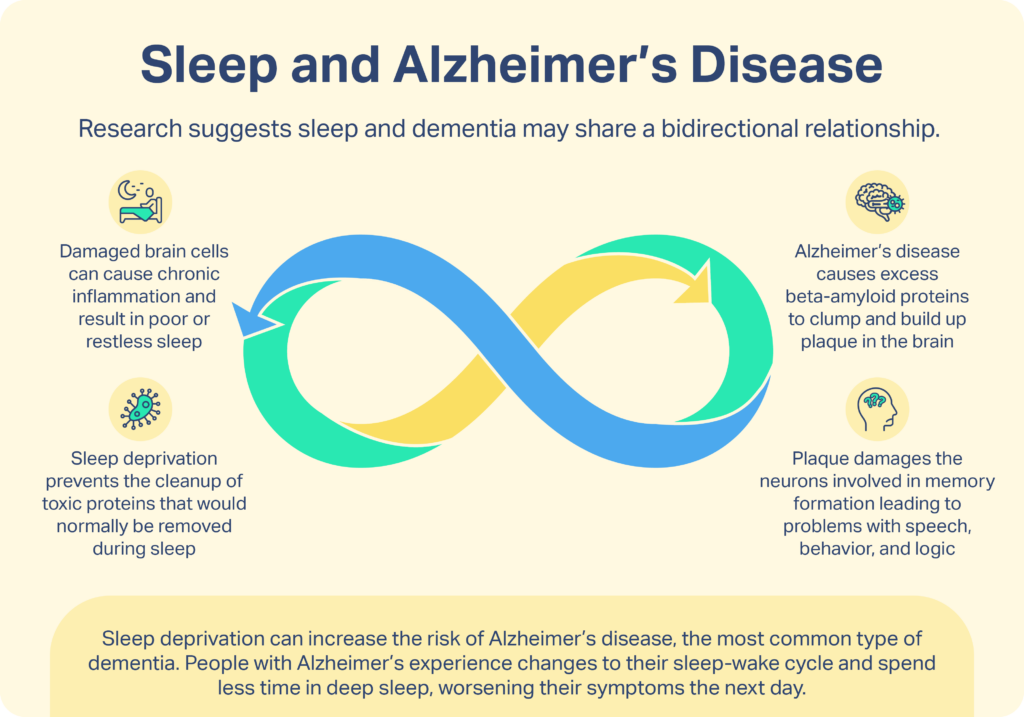These sleep habits significantly increase your risk of dementia, according to recent studies. Irregular sleep patterns, including inconsistent bedtimes and waking times, have been found to be associated with a higher risk of developing dementia.
Additionally, inadequate sleep duration and a lack of deep sleep have also been linked to an increased risk of dementia. It is crucial to prioritize healthy sleep habits to reduce the risk of this debilitating condition.
Understanding The Risk
Certain sleep habits have been found to significantly increase the risk of dementia. Irregular sleep patterns, lack of sleep, and skipping breakfast have all been linked to a higher likelihood of developing dementia. It is crucial to prioritize healthy sleep habits to reduce the risk of this cognitive disorder.
What Is Dementia?
Dementia is a cognitive decline disorder characterized by memory loss, impaired thinking, and difficulty in performing daily activities. It is a progressive condition that affects older adults, with Alzheimer’s disease being the most common form of dementia. As the condition worsens, individuals may experience changes in behavior, mood swings, and struggles with communication.Connection Between Sleep Habits And Dementia
Recent research has shed light on the significant impact of sleep habits on the risk of developing dementia. Irregular sleep patterns, such as frequently changing bedtime routines and inconsistent sleep durations, have been shown to increase the likelihood of developing dementia. This association is believed to be linked to the disruption of important brain processes that occur during sleep, including the removal of toxic proteins and the consolidation of memories. Furthermore, sleep disorders like sleep apnea and insomnia have also been found to contribute to an increased risk of dementia. These conditions disrupt sleep quality and quantity, which in turn affect the brain’s ability to function optimally. The accumulation of sleep debts over time can lead to long-term cognitive deficits and an elevated risk of dementia. In addition to the quantity and quality of sleep, the timing of sleep has also been found to play a crucial role in dementia risk. Research suggests that individuals who consistently experience sleep disturbances during the rapid eye movement (REM) stage of sleep are at a higher risk of developing dementia. REM sleep is essential for memory consolidation and emotional processing, and its disruption may further contribute to cognitive decline. To minimize the risk of dementia, it is crucial to prioritize healthy sleep habits. Establishing a consistent sleep schedule, ensuring sufficient sleep duration, and addressing any sleep disorders are important steps to maintain brain health. Additionally, incorporating good sleep hygiene practices such as creating a relaxing bedtime routine, limiting exposure to electronic devices before sleep, and maintaining a comfortable sleep environment can also contribute to a lower risk of dementia. By recognizing the connection between sleep habits and dementia and taking proactive steps to prioritize healthy sleep, individuals can significantly reduce their risk and promote overall brain health.
Credit: www.healthline.com
Sleep Habits That Increase Risk
Irregular sleep patterns, lack of sleep in middle age, and loss of slow-wave sleep are sleep habits that can significantly increase your risk of dementia. These sleep habits disrupt the normal sleep-wake cycle and have been linked to various negative health effects, including an increased risk of developing dementia. It is crucial to prioritize healthy sleep habits to protect your brain health and reduce the risk of cognitive decline.
Irregular Sleep Patterns
Irregular sleep patterns refer to inconsistent bedtimes and wake-up times. Many people have irregular sleep patterns due to shift work, social obligations, or poor sleep hygiene. However, research suggests that these irregularities can have a detrimental impact on brain health. A study published in Medical News Today found that people with irregular sleep patterns have a higher risk of dementia. Sleep regularity, which involves going to bed and waking up at the same general time each day, is crucial for maintaining a healthy sleep-wake cycle and promoting optimal brain function.
Lack Of Sleep In Middle Age
Getting enough sleep is important at every stage of life, but research suggests that the amount of sleep we get in middle age can have long-term consequences. A study conducted by the National Institutes of Health found that inadequate sleep duration in middle age may increase the risk of dementia later in life. It is recommended that adults aim for 7-9 hours of quality sleep per night to support brain health and reduce the risk of cognitive decline.
Loss Of Slow-wave Sleep
Slow-wave sleep, also known as deep sleep, is an essential stage of the sleep cycle. During slow-wave sleep, the brain consolidates memories, repairs tissues, and promotes overall restoration. However, as we age, we tend to experience a decline in slow-wave sleep. This loss of slow-wave sleep has been associated with an increased risk of dementia. To optimize brain health, it is important to prioritize activities and habits that promote deep, restorative sleep.
In conclusion, maintaining healthy sleep habits is crucial for protecting brain health and reducing the risk of dementia. Irregular sleep patterns, lack of sleep in middle age, and the loss of slow-wave sleep are sleep habits that can significantly increase the risk of developing cognitive decline. By prioritizing consistent sleep patterns, getting adequate sleep, and optimizing slow-wave sleep, you can support your brain health and reduce the risk of dementia.
Reducing The Risk
Reducing the risk of dementia starts with establishing regular sleep patterns, maintaining good sleep hygiene, and understanding the importance of sleep for dementia prevention. By implementing these habits, you can significantly decrease your risk of developing this debilitating condition.
Establishing Regular Sleep Patterns
Establishing regular sleep patterns is crucial for reducing the risk of dementia. Going to bed and waking up at the same time each day helps regulate your body’s internal clock and promotes better sleep quality. By setting a consistent sleep schedule, you train your brain to anticipate sleep and optimize the production of sleep-inducing hormones.
Tips for establishing regular sleep patterns:
- Avoid napping during the day or limit it to 30 minutes
- Create a relaxing bedtime routine, such as reading a book or taking a warm bath
- Avoid caffeine and electronic devices before bed
- Ensure your bedroom is dark, quiet, and at a comfortable temperature
Maintaining Good Sleep Hygiene
Maintaining good sleep hygiene is essential for reducing the risk of dementia. Sleep hygiene refers to the habits and practices that promote healthy sleep. By adopting these habits, you can optimize your sleep environment and improve your overall sleep quality.
Tips for maintaining good sleep hygiene:
- Avoid stimulating activities before bed, such as vigorous exercise or watching intense movies
- Use your bed only for sleeping and intimate activities, avoiding work or screen time
- Keep your bedroom clean and clutter-free
- Invest in a comfortable mattress and pillows
Importance Of Sleep For Dementia Prevention
Sleep plays a crucial role in dementia prevention. During sleep, the brain undergoes essential processes such as memory consolidation and toxin removal. Chronic sleep deprivation or poor sleep quality can impair these processes, leading to an increased risk of cognitive decline and dementia.
Benefits of quality sleep for dementia prevention:
- Aids in memory consolidation and information processing
- Supports cognitive function and mental clarity
- Allows for the removal of toxic substances, reducing brain inflammation
- Enhances overall brain health and resilience
By prioritizing regular sleep patterns, maintaining good sleep hygiene, and understanding the importance of quality sleep for dementia prevention, you can take proactive steps towards reducing your risk of developing this debilitating condition.

Credit: www.sleepfoundation.org
:max_bytes(150000):strip_icc()/This-One-Habit-Can-Significantly-Improve-Your-Gut-Health-And-It-Has-Nothing-to-Do-With-Diet-2000-26151233644348cda4e269ca090f5bf1.jpg)
Credit: www.eatingwell.com
Frequently Asked Questions For These Sleep Habits Can Significantly Increase Your Risk Of Dementia.
What Is The Most Common Bedtime Habit That Triggers Dementia?
Irregular sleep patterns have been linked to a higher risk of dementia.
What Morning Habit Increases Dementia?
Skipping breakfast is a morning habit that increases the risk of dementia. Studies have shown that skipping breakfast is not only a risk factor for diabetes but potentially for dementia as well. It is important to maintain a regular breakfast routine to support brain health.
Is There A Link Between Sleep Walking And Dementia?
Sleep walking is not necessarily a sign of dementia. It can occur in children and persist throughout life. However, acting out dreams is associated with degenerative brain diseases, which can be linked to dementia. Determining the stage of sleep during which the walking occurs is important.
[46 words]
Why Is Melatonin Not Recommended For Dementia Patients?
Melatonin is not recommended for dementia patients because its effectiveness in treating sleep disorders related to dementia is uncertain. Additionally, melatonin can potentially interact with other medications and may have side effects such as daytime sleepiness and confusion.
Conclusion
It is crucial to prioritize healthy sleep habits to reduce the risk of dementia. Studies have shown that irregular sleep patterns, inadequate sleep duration, and the loss of deep sleep can significantly increase the likelihood of developing dementia. By maintaining regular sleep schedules, getting enough sleep, and prioritizing deep sleep, we can potentially lower our risk of dementia.
Take steps to prioritize your sleep for a healthier brain and overall well-being.
